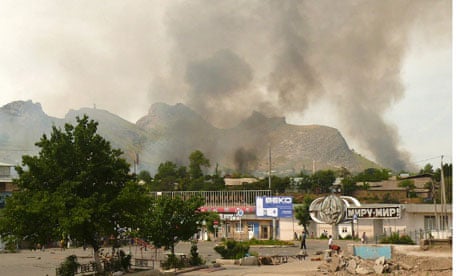Kyrgyzstan was tonight in the grip of a bloody ethnic war after rioting that erupted four days ago in the southern city of Osh spread rapidly to other areas, with gun battles raging between Kyrgyz and Uzbek youths.
The country's interim government granted its security forces shoot-to-kill powers and promised to send a volunteer force to the region. But the violence continued, taking the death toll since Thursday night to more than 100.
At least 1,100 have been wounded in what are the country's worst ethnic clashes for 20 years. Mobs of Kyrgyz men were yesterday burning Uzbek villages slaughtering residents and storming police stations, witnesses said.
Thousands of terrified ethnic Uzbeks flooded to the nearby border with Uzbekistan after their homes were destroyed. Witnesses reported that women and children were gunned down as they tried to escape. Kyrgyzstan opened its crossing with Uzbekistan, but many refugees appeared to be stuck.
While the situation in Osh was said last night to be stabilising, rampages broke out in Jalal-Abad, another major southern city, 40 km away, and in surrounding villages. Gunfire echoed across the city, despite heavy rain, as mobs set fire to Uzbek houses, stores and cafes.
The rioters seized an armoured vehicle and automatic weapons from a local military unit. At one point they tried to storm the hospital. Gangs of youths marauded through the streets, the Kyrgyz agency AKIpress reported, blockading the centre of town with barricades. There was also intense fighting at the city's university.
"Gunfire on the streets is continuing," Jalil Saparov, a local journalist in Jalal-Abad, told the news website 24.kg. "There are no patrols, no government forces, just continuous shooting. It's clear those forces and means at the disposal of the regional authorities are completely inadequate."
Tonight Kyrgyz soldiers were trying to disperse rioters in Osh by firing in the air. Much of the city, Kyrgyzstan's second largest, has been destroyed, with entire Uzbek neighbourhoods razed. Triumphant crowds of Kyrgyz men took to the streets, while the few remaining Uzbeks barricaded themselves in their homes.
Eyewitnesses said bodies lay among the rubble, and were starting to smell. Most of the victims appeared to be Uzbek. At least one Pakistani student in Osh was killed during the rioting, and 15 others taken hostage, Pakistan's foreign ministry said. Food supplies had run out, and there was no gas or electricity.
"They are killing us with impunity," retired builder Habibullah Khurulayev told Reuters.
"The police are doing nothing ... They are helping them kill us. There are not many of us left to shoot." Khurulayev said police had refused to escort Uzbeks to the border six miles away, and added that Uzbeks were defending themselves with hunting rifles.
Kyrgyzstan's interim leader Rosa Otunbaeva has blamed the country's ousted president Kurmanbek Bakiyev for instigating the unrest. Last month his supporters briefly seized government buildings in Jalal-Abad and other areas.
Bakiyev – who fled in April after his troops shot dead 85 unarmed protesters – said claims he ordered the disturbances were "shameless lies". "The Kyrgyz republic is on the verge of losing its statehood. People are dying and no one from the current authorities is in a position to protect them," he said from Belarus.
In reality, the pro-Bakiyev movement in south Kyrgyzstan has quickly morphed into a violent ethnic conflict. Most of the Uzbeks support the new interim leadership. In the absence of any meaningful government, long-simmering ethnic tensions appear to have exploded, fanned by criminal conflicts.
There are fears among other central Asian nations that the ethnic slaughter could spread. It will also concern the US, which operates a military base near the capital, Bishkek, supplying troops in Afghanistan. The US Embassy in Kyrgyzstan deplored the ongoing violence and called for the "immediate restoration of order and a respect for rule of law".
On Saturday Otunbayeva appealed to the Kremlin to send troops to restore order. Russia's president, Dmitry Medvedev, refused, saying the rioting was an "internal conflict", though he did send a battalion of paratroopers with the sole responsibility of reinforcing security at Russia's airbase in Kant, in the north of the country. He will discuss how to respond to the crisis later tomorrow with regional allies. The toll of dead and injured is likely to rise sharply, with many Uzbeks too terrified to travel to hospitals.
According to the Associated Press, citing local officials, Kyrgyz mobs killed about 30 Uzbeks today in the village of Suzak in the Jalal-Abad region. Another Uzbek village, Dostuk, was burned by Kyrgyz assailants, but it was not known how many people were killed there.
Ethnic Uzbeks ambushed about 100 Kyrgyz men on a road near Jalal-Abad and took them hostage, officials said. Vehicles on the main highway near Jalal-Abad repeatedly came under fire from unidentified gunmen. In the nearby village of Bazar-Kurgan, a mob of 400 Uzbeks overturned cars and killed a police captain. Residents said armed Kyrgyz men were flooding into the village to retaliate.
The fertile Ferghana Valley, where Osh and Jalal-Abad are located, once belonged to a single feudal lord, but it was split by Soviet dictator Josef Stalin between Uzbekistan, Kyrgyzstan and Tajikistan. The Stalinist borders rekindled old rivalries and fomented ethnic tensions.
In 1990, hundreds were killed in a violent land dispute between Kyrgyz and Uzbeks in Osh, and only the quick deployment of Soviet troops quelled the fighting. With no Russian troops in sight, the interim government late on Saturday night announced a partial mobilisation of military reservists up to 50 years old.
